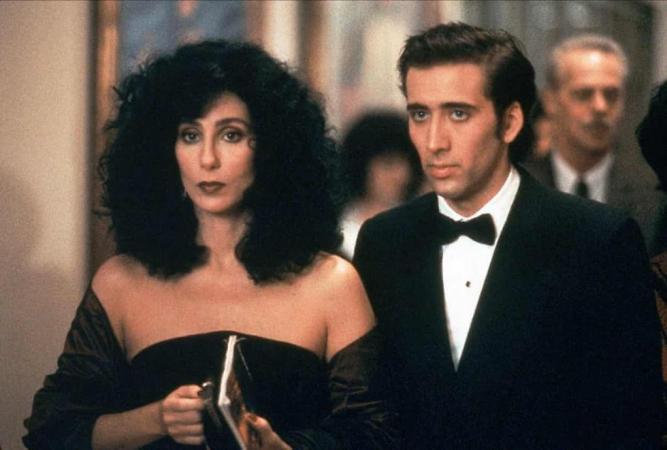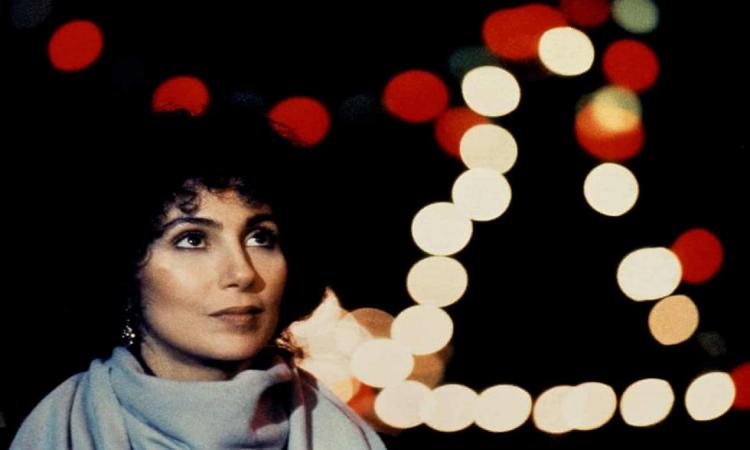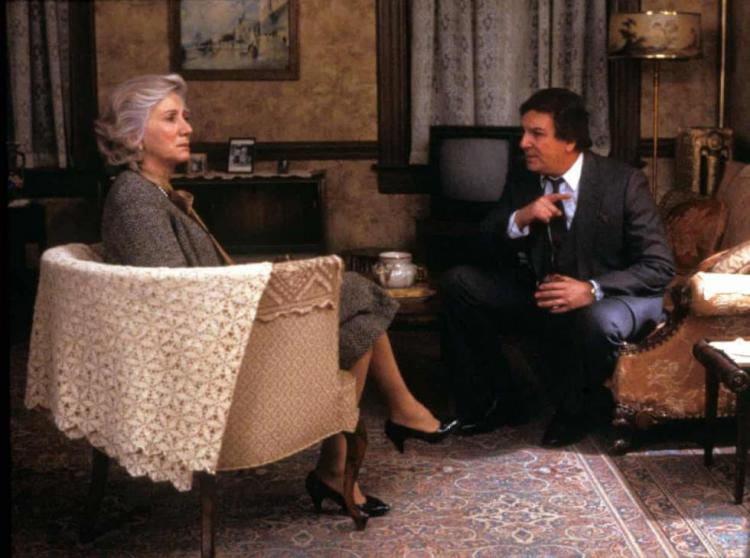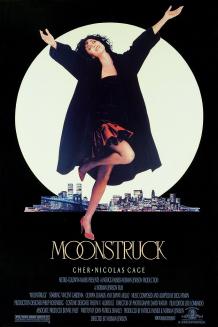VALENTINE'S DAY Special 35th Anniversary Screening of MOONSTRUCK
Mon. Feb. 14th, 7:30pm, Special Pricing $15.00
Have a romantic night with the one you love and help support the cinema you love!
Moonstruck: Cher's 1987 classic is bizarre, hopelessly romantic and yet somehow entirely plausible
Cher’s Oscar-winning turn falling for an unsettlingly charismatic Nicolas Cage is a glorious contributionto the romantic comedy canon
Helen Sullivan - The Guardian

Cher and Nicolas Cage as Loretta Castorini and Ronny Cammareri in Moonstruck. Photograph: Allstar/MGM
In Moonstruck, a 1987 romantic comedy set in Brooklyn, Loretta Castorini (Cher) explains to Ronny Cammareri (an unsettlingly charismatic 23-year-old Nicolas Cage) that he’s a wolf.
Ronny lost his hand in a bread-slicer incident that he blames on his brother Johnny, Loretta’s fiance. The brothers haven’t spoken since the accident, five years earlier, which caused Ronny’s own fiancee to leave him for another man. Now Loretta has been sent to convince Ronny to come to the wedding of his brother.
“You’re a wolf,” she tells him.
“I’m a wolf?” he asks and scratches at his jawbone distractedly, like a wolf might.
“The big part of you has no words and it’s a wolf. That woman was a trap for you. She caught you and you couldn’t get away so you chewed off your own foot. That was the price you paid for your freedom.”
They’re sitting in Ronny’s kitchen. Moments later, he scoops Loretta up and carries her to his bed.
Moonstruck was the fifth-highest-grossing film in the US that year. Cher won an Oscar for her performance; the film was nominated for six altogether. It also won best original screenplay – it was written by John Patrick Shanley, who later won a Pulitzer for the play Doubt – and best supporting actress for Olympia Dukakis, who plays Loretta’s mother, Rose.

Moonstruck is mostly set in a wintry, steam-from-manholes, brownstone-and-Italian-family-restaurant Brooklyn. Photograph: Allstar/Cinetext/MGM
When I told my mother-in-law I was watching the film, she dissolved into laughter and quoted Ronny after the opera: “I. Want. You. In. My. Bed!” My father-in-law overheard her and yelled from somewhere in the house, “I used to have to dress up as Nicolas Cage!”
Recently, journalist Rachel Handler retweeted a short clip of actor Mandy Patinkin and Kathryn Grody, saying that interviewing them two years ago was like watching “the Jewish version of Moonstruck”. In the clip, they talk about having had a fight on their wedding anniversary. And crying when they made up. And the poor dog witnessing it all.
And that’s what Moonstruck is like. Human, true, funny – and hopelessly, gloriously romantic.
The film opens with a man securing a poster for La Bohème in a glass display case at The Met. Ronny loves the opera and will later take Loretta there, promising, after the kitchen pep talk, and after he tells her he loves her, that if she accompanies him just this once, he will leave her alone forever.
Moonstruck is mostly set in a wintry, steam-from-manholes, brownstone-and-Italian-family-restaurant Brooklyn. On an episode of the New York history podcast The Bowery Boys dedicated to the film, the hosts point out that, like an opera, Moonstruck’s characters each have specific themes they return to. For Loretta, it’s luck – she believes hers is bad. For Rose Castorini, it’s her belief that men chase women because they fear death: her husband Cosmo (Vincent Gardenia) is having an affair with a woman named Mona (Anita Gillette).
Gardenia has one of those faces that always make me think of Maria in James Joyce’s Clay. “When she laughed,” Joyce writes, “the tip of her nose nearly met the tip of her chin.” We’d know for sure if Cosmo ever laughed. But he’s sick of his life – he fears death – so Mona laughs for him, at even his most banal stories about selling copper plumbing piping. Mona says precisely nothing of value. In Moonstruck, the heroes have the best lines: adulterer though he may be, we know Cosmo is worthy of his wife’s devotion because he says things like (albeit when giving Mona a charm bracelet of birds and stars): “Birds ... fly to the stars, I guess.”

Olympia Dukakis and Danny Aiello in Moonstruck. Photograph: Moviestore/REX/Shutterstock
The film’s broader themes are love and passion – between couples who’ve been together forever, and those who ought to be. It has the other tropes of any good romantic comedy, too – including a makeover scene, after which Loretta sits in front of a fire, her new clothes and Clinique lying on the floor surrounded by the tissue paper they came in, like a small village at sunset, bordered by snowy peaks lit peach.
What makes it a truly wonderful film is that the lines are so incredibly surprising. Bizarre, deranged even, and yet somehow entirely plausible.
When I told my mother-in-law I was watching the film, she dissolved into laughter and quoted Ronny after the opera: “I. Want. You. In. My. Bed!” My father-in-law overheard her and yelled from somewhere in the house, “I used to have to dress up as Nicolas Cage!”
Recently, journalist Rachel Handler retweeted a short clip of actor Mandy Patinkin and Kathryn Grody, saying that interviewing them two years ago was like watching “the Jewish version of Moonstruck”. In the clip, they talk about having had a fight on their wedding anniversary. And crying when they made up. And the poor dog witnessing it all.
And that’s what Moonstruck is like. Human, true, funny – and hopelessly, gloriously romantic.



